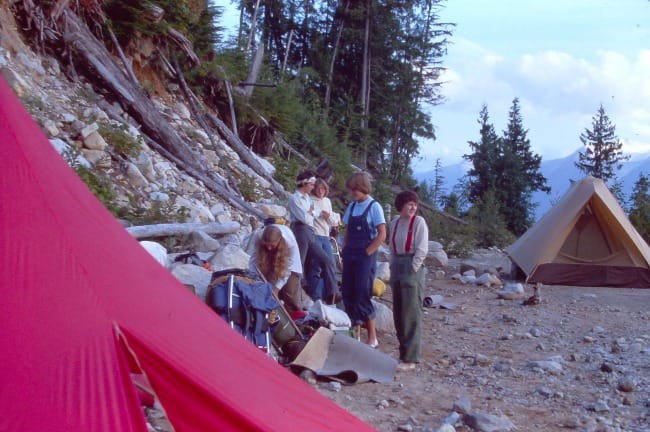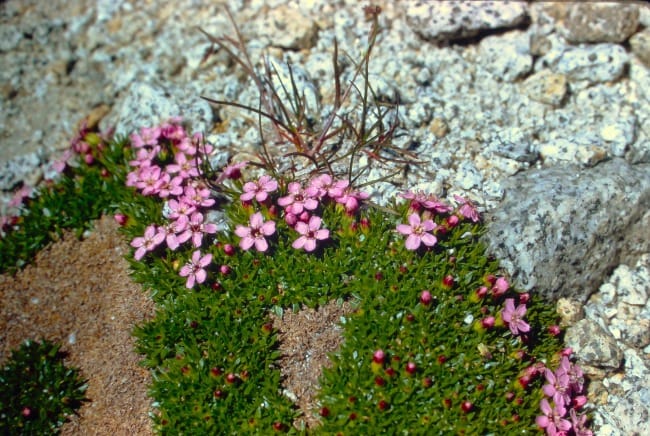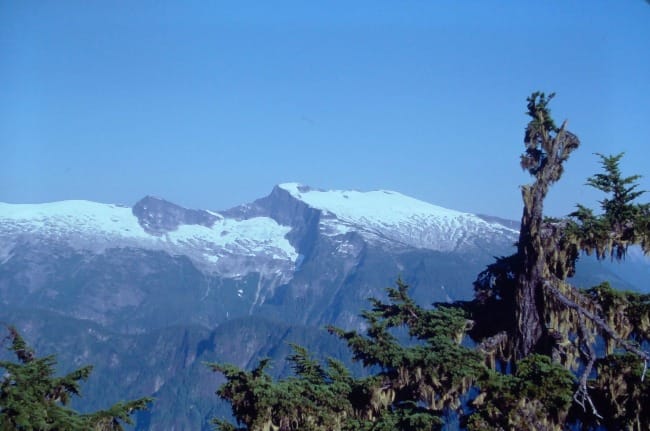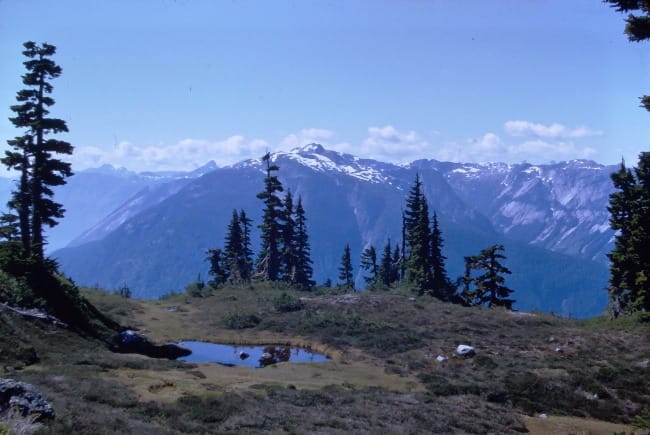When I was in my twenties, I was a mountaineering guide for a Young Life camp in British Columbia. We led groups of high school students (and some adult groups) on one-week hiking and climbing trips in the Coast Range Mountains, 100 miles north of Vancouver, BC. One iconic experience in particular during that time was emblematic of two shifts in my theological thinking. The first was about how God creates and inhabits the natural world–in a way that reflected both my faith and my education in the sciences. The second was my newfound openness to hearing from thoughtful Christians of all denominations.
I was in my third summer of guiding at the camp–a pivotal summer just before I embarked on my career in marine science. After finishing my undergraduate years in college, I had spent several years working as a carpenter at a shipyard in Seattle during the fall, winter and springs of each year and guiding in BC during the summers. During this time, I was pondering my future and had finally decided to follow my passion for marine biology, sparked by classes I had taken at the University of Washington’s Friday Harbor Marine Labs and at the Bermuda Biological Station. That fall I would start work as a research assistant at the UW School of Fisheries and begin preparing for graduate school.
One week in August of that third summer, I was assigned to co-lead a group of adults. Our assigned route was to climb 7,000 foot high Mount Pearkes at the head of Jervis Inlet. Our group spanned a wide range of ages, home towns and backgrounds, including a married couple from Ontario, Jim and Ann. Jim was a graduate student in English at the University of Toronto. He and his wife were interesting, well-read, and well-travelled–they had even taken the Trans-Siberian railroad across Russia!

We started the trip early on a cool, misty morning. We rode in the camp landing craft down the Inlet to the base of the mountain, as the fog was beginning to lift off the inlet. It would turn out to be one of those weeks when it never rained–high summer in the Pacific Northwest. Once ashore, we began to hike on an old gravel logging road–up through ragged, clear-cut wastelands, camping on the first night at the end of the last switchback. The next day we hiked up into the untouched forests above the logged-off areas to our second night’s campsite by a small lake.

On the afternoon of the third day, I was in front, leading the group through sunlit alpine meadows of heather and wildflowers, as the mist from off the inlet evaporated above us. Jim was following just behind me. We were all lost in our own thoughts and focused on the physical exertion of the hike. Above us, we could see snowfields and glaciers glinting in the sun–and on the high horizon, beneath an intensely blue sky, the white snowclad summit of Mount Pearkes.

Quite unexpectedly, Jim began to recite a poem–one I had never heard before. As the carefully articulated words floated up into the cool breeze, I was struck by how they seemed to capture the awe I felt about the spectacular mountain scenery all around us. Then abruptly the poem shifted tone to acknowledge and lament humanity’s tragic propensity to ruin such places–the clear cuts we had seen on our first day of the hike standing in mute witness. The poem resolved this tension at the end by evoking the resilience of nature and the presence of the Holy Spirit:
The world is charged with the grandeur of God.
It will flame out, like shining from shook foil;
It gathers to a greatness, like the ooze of oil
Crushed. Why do men then now not reck his rod?
Generations have trod, have trod, have trod;
And all is seared with trade; bleared, smeared with toil;
And wears man’s smudge and shares man’s smell: the soil
Is bare now, nor can foot feel, being shod.
And for all this, nature is never spent;
There lives the dearest freshness deep down things;
And though the last lights off the black West went
Oh, morning, at the brown brink eastward, springs –
Because the Holy Ghost over the bent
World broods with warm breast and with ah! bright wings.
After Jim had finished reciting, I stopped in my tracks, turned around, and exclaimed, “What was that? And who wrote it?” He smiled and said, “God’s Grandeur by Gerard Manley Hopkins”—a poet completely unfamiliar to me.

The poem and the idea that nature is charged with the electric grandeur of God really struck me with a sense of wonder and awe. When I returned to Seattle that fall, I bought a paperback volume of Hopkins’ poems edited by W.H. Gardner. This allowed me to go on discovering his unique poetry, including remarkable poems such as: As Kingfishers Catch Fire, The Windhover, Binsey Poplars and That Nature is a Heraclitean Fire and of the Comfort of the Resurrection.
In my reading I also discovered that Hopkins had invented two words to convey his concepts of how God created and infused the natural world with identity and energy: inscape and instress. By inscape Hopkins means the unique, essential essence of objects, animals, plants and people–even places have their own inscape. Hopkins himself best describes inscape in the multiple metaphors of his poem As Kingfishers Catch Fire. His idea of inscape resonated with me as a biologist–having learned in detail about the unique genetic codes of species and individuals. Hopkins’ spiritual and poetic intuition somehow brought him to an understanding of the nature of living things that science only arrived at in the twentieth century with the rediscovery of Mendel’s laws of genetics and the discovery of DNA.
By instress Hopkins means the force(s) that hold the inscapes/identities of God’s creations within them. This idea reminded me of what I had learned in my physics classes of the forces that hold together everything from sub-atomic particles to the universe itself–even though Hopkins lived well before development of the standard model of particle physics in the twentieth century. The vast amount of energy held within things is expressed in Einstein’s famous equation E = mc2 as demonstrated by the tremendous release of that energy in a nuclear reaction or explosion.
Things in nature are indeed charged with the grandeur of God and the enormous tension of the forces contained inside them can sometimes ‘flame out’ or ‘ooze out’ like oil as Hopkins states metaphorically in his poem, a phenomenon perhaps also experienced by Moses as he tries to comprehend what he saw on Mount Horeb–seeing God in the form of a burning bush that was mysteriously not consumed. Sometimes we also are privileged to witness this holy fire.
Discovering and being able to appreciate the poetry of Gerard Manley Hopkins, a Jesuit Catholic, was also emblematic of another shift in my theological thinking. This shift had started when I was in late high school/early college and ended up greatly expanding my view of the Christian faith. The essence of this shift was being open to learning from Christian denominations and para-church organizations other than the church I had grown up in–the United Methodist Church.
One important thing I took away from the Methodist church was the necessity of a heartfelt decision to follow Christ, and the importance of evangelism. Then, my participation in Young Life in a campaigners group and later as a mountaineering guide showed me the life-giving importance of relationships, Christian community and the importance of being honest with others about your life and spiritual journey. At about the same time I began attending The Inn–the college ministry of University Presbyterian Church, a church my wife and I later joined as members. The Presbyterian Church gave me a real appreciation for the importance of knowing what you believe and why and the value of learning from inspiring and challenging pastors. During this time, I was also introduced to the writings of C.S. Lewis (Anglican), J.R.R. Tolkien (Catholic), Dietrich Bonhoeffer (Lutheran) and other Christian thinkers from all the branches of the universal church—a list to which I now added Gerard Manley Hopkins.
Gerald
